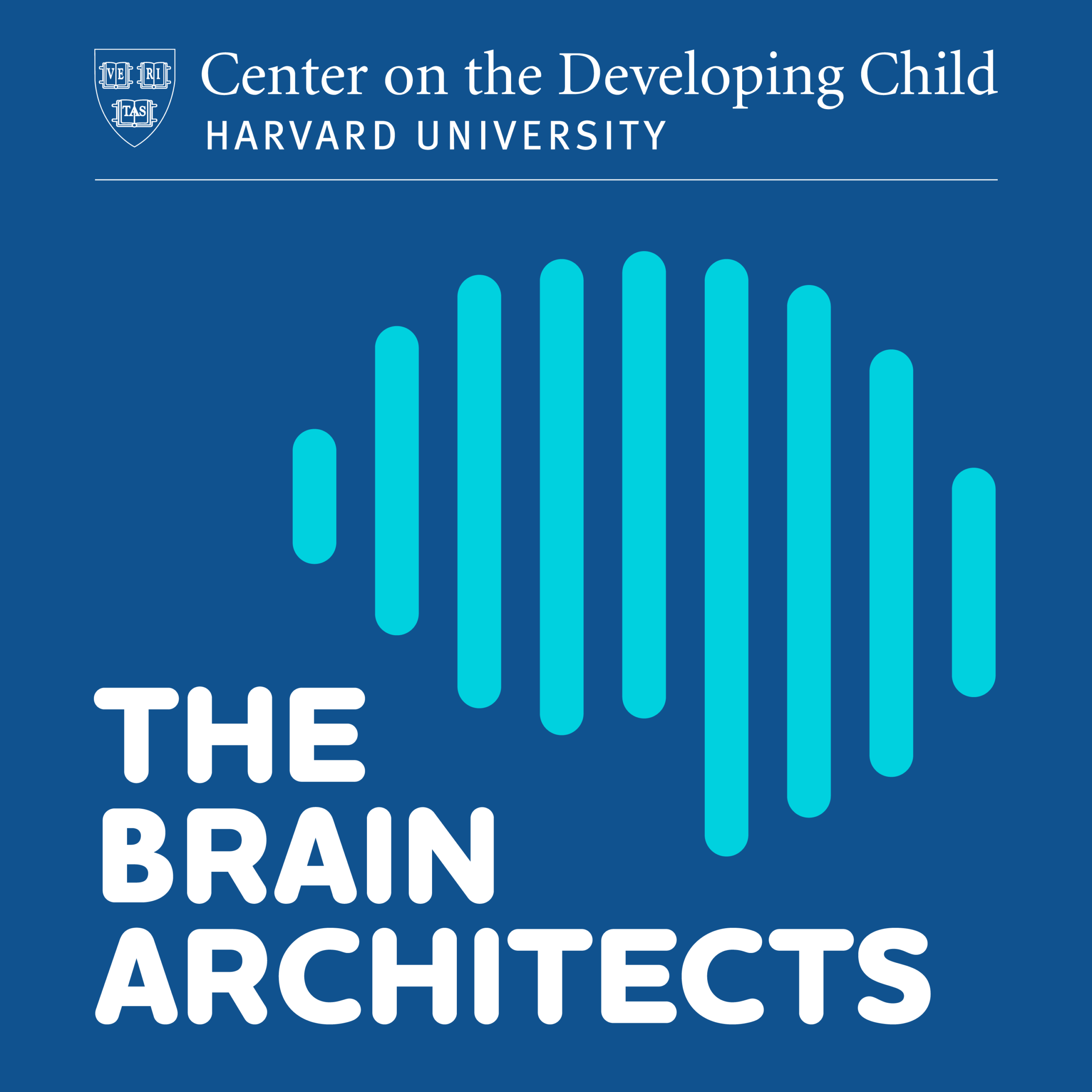COVID-19 Special Edition: A Different World
Description
While the coronavirus pandemic has changed many things around the world, it has not stopped child development. In this series of special episodes of The Brain Architects podcast, we aim to share helpful resources and ideas in support of all those who are caring for children while dealing with the impacts of COVID-19.
The first guest of this special series is Center Director Dr. Jack Shonkoff. He and host Sally Pfitzer discuss how to support healthy child development during a pandemic, including the importance of caring for caregivers. They also talk about what we’ve already learned as a result of the coronavirus, and what we hope to continue learning.
Upcoming episodes of this special series will focus on how pediatricians are responding, racial disparities in the impact of the virus, and more. Subscribe below via your podcast platform of choice to receive all new episodes as soon as they’re released.
Speakers
<figure id="attachment_4958" aria-describedby="caption-attachment-4958" style="width: 125px" class="wp-caption alignnone">
 <figcaption id="caption-attachment-4958" class="wp-caption-text">Sally Pfitzer, Podcast Host</figcaption></figure>
<figcaption id="caption-attachment-4958" class="wp-caption-text">Sally Pfitzer, Podcast Host</figcaption></figure><figure id="attachment_4959" aria-describedby="caption-attachment-4959" style="width: 125px" class="wp-caption alignnone">
 <figcaption id="caption-attachment-4959" class="wp-caption-text">Dr. Jack Shonkoff, Center Director</figcaption></figure>
<figcaption id="caption-attachment-4959" class="wp-caption-text">Dr. Jack Shonkoff, Center Director</figcaption></figure>Transcript
Sally: Welcome to The Brain Architects, a podcast from the Center on the Developing Child at Harvard University. I’m your host, Sally Pfitzer. Since our last podcast episode was released, things have changed quite drastically as a result of the Coronavirus pandemic. We hope you and your loved ones are safe and well. During this unprecedented time, we would like to share resources and provide guidance that you may find helpful, so we’re creating a series of podcasts episodes that address COVID-19 and how it relates to child development. Our guest today is Center Director, Dr. Jack Shonkoff. Jack, thanks so much for joining us.
Dr. Shonkoff: Thank you, Sally. It’s always a pleasure.
Sally: So just so our listeners know, we’re recording this on a video call, so the sound quality will be a little different from when we are in the studio. We hope these conversations will be useful anyway. Especially to those parents, childcare providers, social workers, teachers, healthcare providers and any others who are with children every day during this crisis. So, I’ll start with the first one. Jack, how do you think the pandemic may be affecting very young children, so the infants and toddlers? There has been a lot of attention to the need for distance learning for older kids. But, what do you think about what these younger children might need?
Dr. Shonkoff: That’s a really important question, Sally, because this pandemic is different from anything that any of us have experienced around the world. Basic principles of child development, basic concepts of the science that we know don’t change, then I would say from my perspective try it on both the best science we have and the best common sense that once again this is all about relationships. This is all about the environment of relationships in which young children are developing and which they are growing up. So, the risk of the conversation is how do we feel that in this context, but it’s not a difference science, it’s not a different understanding of what children need, it’s just a different world right now.
Sally: Yeah. So, I am sure many of our listeners have heard this term “social distancing,” but I know that it is also lately being referred to as the need for physical distancing. Can you talk a little bit more about the science behind that, and what it means for children?
Dr. Shonkoff: Yeah, this is the question that I’m most concerned about. There are two different bodies of science that we are talking about right now. Normally, we talk about the science of early childhood development—science of brain development—and now we are also dealing with the science of infectious disease. It’s really physical distancing that we are talking about. Actually, social distancing is exactly what we don’t want if social distancing means that we get further apart in terms of our interactions socially as opposed to physically. Let me just talk a little bit about each. So, why is physical distancing so important? Because this is the way we stop the spread of this virus. This virus is incredibly contagious. It can jump from one person to another over a six-foot span. Everybody has heard about keeping 6-feet away. And, because it is so contagious and spreading all over the world, and without a treatment and without a vaccine, the only real strategy we have to stop the spread of this virus is to not have people be close enough to each other so they can pass the virus from one person to another—it’s a population issue, it’s a community issue. So yeah, we have to do that. We have to minimize the physical contact to stop the spread of the virus. They’re saying time—social connection, hugging, being together— is one of the most critical dimensions of healthy development. It is the heart of serve and return interaction between young children and the adults that care for them. So, that’s a core concept for healthy development. Physical distancing is a core concept for stopping the spread of a virus. The challenge is: how do we reconcile those two? If we just come together physically, the virus doesn’t stop. If we separate physically and don’t find a way to stay connected, then we are creating an environment that is undermining the healthy development in young children. I have to say, I want to express tremendous solidarity with the parents, the caregivers, service providers, who are struggling with this tension between the need to get connected and the mandate to stay physically apart.
Sally: Would you have any recommendations for any family members of caregivers who are experiencing that tension that you were just describing?
Dr. Shonkoff: Absolutely. So, I think the first thing—and this is again, a good example of where basic principle in development under normal circumstances doesn’t change—in a crisis, development goes on, even though the crisis is here. So, one really important thing to remember is that interaction between young children and the adults who care for them and serve and return responsiveness is not something that has to happen every minute of every waking hour. The issue is not all or nothing. And the extent to which it may be more difficult—not because people don’t have opportunities—because adults are really struggling with the pressures and the tensions that they’re feeling. I think many parents out there, many of the caregivers, all of us know that when we’re feeling significant stress, anxiety, unease and maybe even depression about what’s going on, that you don’t have as much energy to be on your best game all of the time. In this particular crisis, it is very important for people to understand that it is okay, and it is important for adults to have a little bit of downtime and pay attention to their own needs. It’s all a matter of balance, right? So, the first thing to think about is what your child needs is a reasonable amount of attentive interaction with you during the day, but that you also need time for yourself. You need time to have your needs met, and that’s also very true in non-crisis situations. In fact, one of the cardinal principles of the science of early childhood development is that if we want to create the best kind of environment for learning and healthy development for young children, we have to make sure that the adults who care for them are having their needs met as well. You know, people often use the example of the airplane: ‘parents put your own mask on before you put your child’s mask on.’ That’s not: ‘you’re more important than your child.’ It’s a way of saying, ‘you can’t take care of your child if your basic needs aren’t met.’ So this is where social relationships—networks—this is where parents supporting each other by smartphone, by FaceTime, or whatever. Interactions that parents have with other members of extended family, their community, their faith-based organizations, service providers you have a relationship with. All of these are necessary, not just to help you meet your child’s need, but to help you meet your own needs. In this particular crisis we are in right now, meeting the needs for the adults who care for children is the only way to meet the needs of children. You can not bypass the needs of the adults.
Sally: So, I think one of the things that’s really obvious about this pandemic is that it is affecting everyone, and every person has some connection or story or something that they are grappling with. I have been thinking about a lot of families that are dealing with economic distress, and wondering if the children who ar





